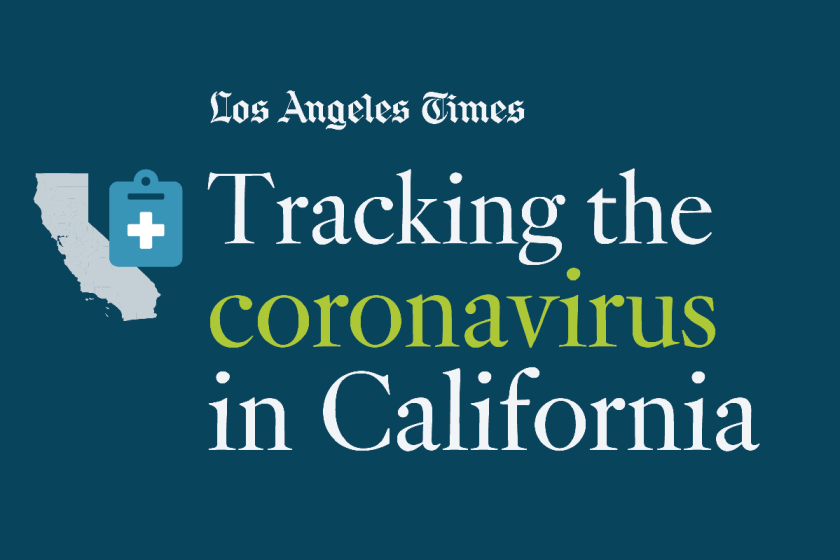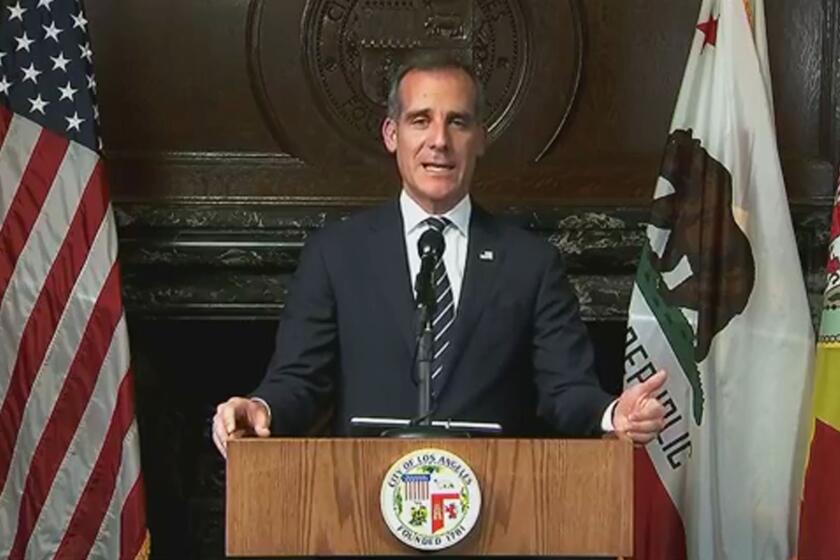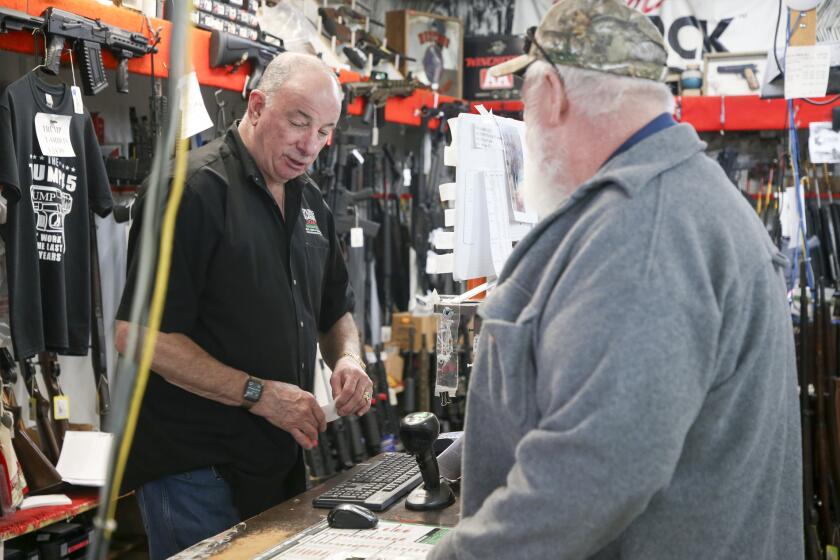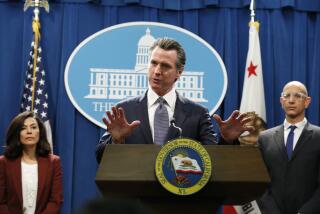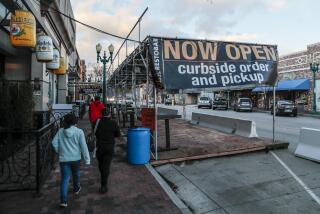To help fight coronavirus, California seniors should isolate and bars should close, Gov. Gavin Newsom says

- Share via
SACRAMENTO — Gov. Gavin Newsom asked Californians over the age of 65 on Sunday to isolate themselves from others and said that neighborhood bars and pubs should close their doors as the number of confirmed coronavirus cases in the state continued to rise.
But Newsom again stopped short of using the full force of his authority to mandate response measures to protect Californians from the virus that causes COVID-19, a global pandemic that has resulted in six deaths and 335 confirmed cases in the state.
Instead, the governor said his request of bars and pubs is akin to an announcement he made last week asking for the cancellation of gatherings of 250 people or more. The governor is allowing restaurants to remain open and advised customers to practice “deep social distancing” when dining out — in effect, a recommendation to reduce occupancy by half.
The governor’s office said his request for the elderly to remain at home also extended to residents with underlying health issues, such as blood disorders, chronic kidney disease, asthma, chronic liver disease, compromised immune systems, pregnancies in the last two weeks, metabolic disorders, heart disease and other conditions that make them more susceptible to serious illness from the coronavirus.
In all, Newsom’s list of new efforts and recommendations reflected the fast-moving nature of the public health crisis and the complexity of how to respond in protecting some 40 million Californians.
The latest maps and charts on the spread of COVID-19 in California.
In addition to the requests for older residents to remain isolated and bars to close, the governor announced additional testing options for two Bay Area counties hit hard by the virus. He also called for a tighter limit on visitors to hospitals and assisted living facilities to only those patients in end-of-life situations. He promised more action to help public school students out of school as well as homeless people. And he pledged additional tax dollars to be spent through the state budget process as needed.
“We need to anticipate spread, but we also need to prioritize our focus,” Newsom said.
Newsom defended his lack of action to close restaurants, saying he’s removing the most vulnerable people from those environments and allowing eateries to continue to provide meals.
“We need the capacity to meet the needs of our population. And let me say this, frankly, we need a productive society,” Newsom said in response to questions about why he wasn’t taking more dramatic measures. “I’m not willing to submit that in this moment we can’t have cohorts of society being productive, just in a radically different way.”
Newsom’s new directive came shortly after Govs. Mike DeWine of Ohio, J.B. Pritzker of Illinois and Charlie Baker of Massachusetts on Sunday issued orders requiring all bars and restaurants across their states to close. Restaurants may continue to offer carryout and delivery service in Ohio, which has approximately 36 confirmed cases of COVID-19.
Newsom insisted that the difference in what he has recommended and what’s happening in other states and localities is a “nuance” that will not affect the effectiveness of protecting public health. He expressed confidence that Californians would follow his directives voluntarily.
Los Angeles bars must close and restaurants must stop dine-in service in an effort to slow the spread of coronavirus, Mayor Eric Garcetti said Sunday night. Restaurateurs and bar owners fear many establishments might not reopen.
When asked whether he had been tested himself, the governor said he had not, noting that he believed available test kits should be prioritized for those who need them most.
The governor said the request of older Californians was made in hopes of limiting their exposure to the virus, given that health officials have pointed out higher dangers for those who are older. He said plans are being made to help carry out the sweeping directive.
“We are prioritizing their safety,” Newsom said.
The new guidelines come following other broad efforts announced in recent days to combat the virus in California. Most of those have been taken on the local level, including the decision by dozens of school districts to shut down operations for the next two weeks or longer. On Friday, Newsom issued an executive order assuring those schools of continued funding during closures.
The governor said he would issue additional directives Tuesday to schools that remain open and said he was especially focused on providing support to low-income families. He suggested some local school officials had not fully thought through the consequences when closing their campuses, including how to continue providing meals to students eligible for free or reduced-price lunches and how to ensure that students with special needs receive adequate care and supervision.
“It’s one thing to say you have a plan and it’s another to actually deliver that plan,” Newsom said.
Some first-time gun buyers fear a social order breakdown and some gun owners worry about potential firearms restrictions amid the coronavirus pandemic.
“Superintendents say, ‘Don’t shut me down. Help me with these kids because right now I don’t know how to help that child. I don’t know how to feed that child,’” Newsom said. “We’re going to do this very thoughtfully, deliberately. I prefer to be responsible to the reality, not the perception.”
Newsom noted that roughly 85% of California K-12 students are in school districts that have already announced closures.
The governor estimated that the directive to seniors would affect 5.3 million Californians. That number includes those most at risk simply due to their age, but he said it does not include the millions more who have underlying health conditions that would make them vulnerable.
Newsom also announced that the state’s 108,000 unsheltered homeless people would be prioritized for mitigation policies, with a significant push to move them indoors. Though details remained unclear, he said the state had hotels and motels that could be used to provide shelter, along with an additional 450 state-owned trailers sent to “critical points” to supplement those that were deployed in Los Angeles, Stockton, Sonoma and other places before the outbreak.
Last week, Newsom issued an executive order allowing the state to commandeer some private properties to provide beds for isolation. Newsom said the goal of the newly announced measures aimed at the unsheltered population was to “get people into environments where we can address their growing anxiety and our growing concerns.”
But he did not say that the attempt to bring people indoors would be mandated or require law enforcement intervention. In recent days, the Department of Housing and Urban Development and the Centers for Disease Control and Prevention have also detailed guidelines for homeless shelters and encampments, many of which include increasing sanitation and providing detailed suggestions for handling ill people in shelter settings.
“I am not ratcheting up a mindset of enforcement,” Newsom said.
Still, the governor acknowledged that the outbreak of the virus was a fluid situation that state and local officials would need to continue to monitor as events merit. But he bristled at questions asking whether his administration’s efforts could be taken as too timid.
“We are guided in a very thoughtful way, not by hysteria,” Newsom said.
More to Read
Sign up for Essential California
The most important California stories and recommendations in your inbox every morning.
You may occasionally receive promotional content from the Los Angeles Times.
